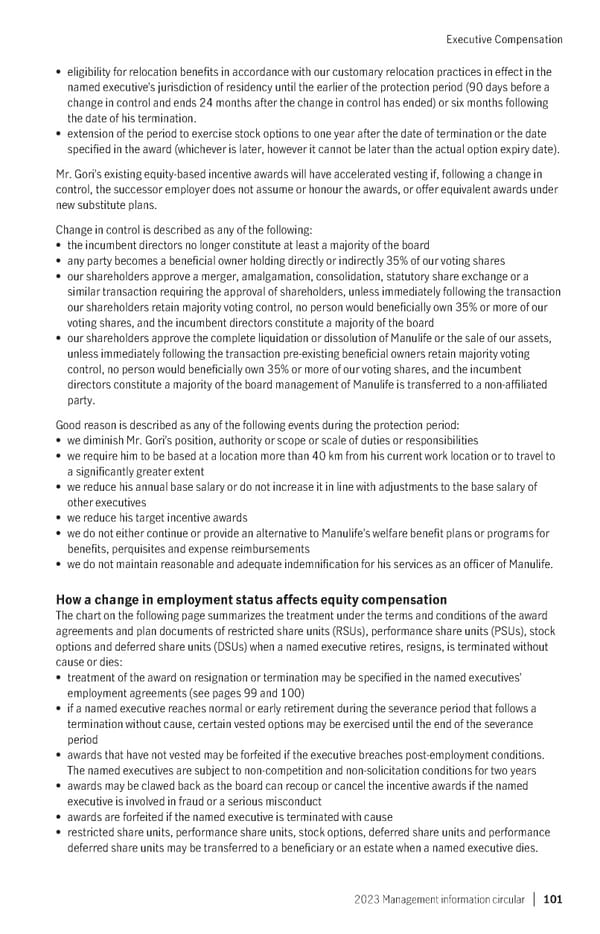Executive Compensation • eligibility for relocation benefits in accordance with our customary relocation practices in effect in the named executive’s jurisdiction of residency until the earlier of the protection period (90 days before a change in control and ends 24 months after the change in control has ended) or six months following the date of his termination. • extension of the period to exercise stock options to one year after the date of termination or the date specified in the award (whichever is later, however it cannot be later than the actual option expiry date). Mr. Gori’s existing equity-based incentive awards will have accelerated vesting if, following a change in control, the successor employer does not assume or honour the awards, or offer equivalent awards under new substitute plans. Change in control is described as any of the following: • the incumbent directors no longer constitute at least a majority of the board • any party becomes a beneficial owner holding directly or indirectly 35% of our voting shares • our shareholders approve a merger, amalgamation, consolidation, statutory share exchange or a similar transaction requiring the approval of shareholders, unless immediately following the transaction our shareholders retain majority voting control, no person would beneficially own 35% or more of our voting shares, and the incumbent directors constitute a majority of the board • our shareholders approve the complete liquidation or dissolution of Manulife or the sale of our assets, unless immediately following the transaction pre-existing beneficial owners retain majority voting control, no person would beneficially own 35% or more of our voting shares, and the incumbent directors constitute a majority of the board management of Manulife is transferred to a non-affiliated party. Good reason is described as any of the following events during the protection period: • we diminish Mr. Gori’s position, authority or scope or scale of duties or responsibilities • we require him to be based at a location more than 40 km from his current work location or to travel to a significantly greater extent • we reduce his annual base salary or do not increase it in line with adjustments to the base salary of other executives • we reduce his target incentive awards • we do not either continue or provide an alternative to Manulife’s welfare benefit plans or programs for benefits, perquisites and expense reimbursements • we do not maintain reasonable and adequate indemnification for his services as an officer of Manulife. How a change in employment status affects equity compensation The chart on the following page summarizes the treatment under the terms and conditions of the award agreements and plan documents of restricted share units (RSUs), performance share units (PSUs), stock options and deferred share units (DSUs) when a named executive retires, resigns, is terminated without cause or dies: • treatment of the award on resignation or termination may be specified in the named executives’ employment agreements (see pages 99 and 100) • if a named executive reaches normal or early retirement during the severance period that follows a termination without cause, certain vested options may be exercised until the end of the severance period • awards that have not vested may be forfeited if the executive breaches post-employment conditions. The named executives are subject to non-competition and non-solicitation conditions for two years • awards may be clawed back as the board can recoup or cancel the incentive awards if the named executive is involved in fraud or a serious misconduct • awards are forfeited if the named executive is terminated with cause • restricted share units, performance share units, stock options, deferred share units and performance deferred share units may be transferred to a beneficiary or an estate when a named executive dies. 2023 Management information circular 101
 2023 Management Information Circular Page 102 Page 104
2023 Management Information Circular Page 102 Page 104